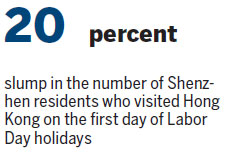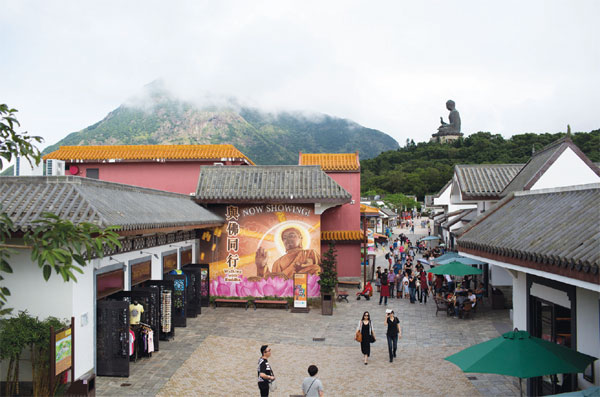Japan, South Korea taking a big slice of mainland tourists
Updated: 2015-05-05 07:07
By Fan Feifei(HK Edition)
|
|||||||
|
Tourists walk in Ngong Ping Village, operated by Ngong Ping 360 Ltd, a subsidiary of MTR Corp, on Lantau Island. Hong Kong is losing its sparks as the most popular destination of mainland outbound tourists. Brent Lewin / Bloomberg |
A growing number of mainland tourists are giving Hong Kong a miss if statistics from the China National Tourism Administration (CNTA) are anything to go by.
While the number of Shenzhen residents who visited the SAR on the first day of the just-ended May Day holidays saw a 20-percent fall year-on-year, mainland tours to Japan, South Korea and Southeast Asian countries have continued to surge, with tours to Japan and the South Korea soaring by 50 percent from last year as a result of favorable exchange rates and relaxed visa rules.
A retired Beijing resident surnamed Lu, who joined a six-day Labor Day trip to Japan, said: "It's very cost-effective shopping in Japan due to the yen's devaluation. Besides, you see a much cleaner environment there." Lu said she visited Tokyo, Osaka, Kyoto and Yokohama, spending tens of thousands of yuan on food, cosmetics, electrical appliances and daily necessities.

"Some of the brands sold in Japan are cheaper than those sold on the mainland due to the depreciation of yen and tax rebates, and it's also getting much easier to apply for a Japanese visa," she said.
According to Ctrip - the mainland's leading online travel agency - the number of mainland tourists going abroad had gone up by 100 percent during last week's May Day holidays compared with the same period last year.
The most popular destinations were South Korea, Thailand and Japan, with Hong Kong coming in fourth.
South Korea has eased visa curbs on mainland visitors who can now obtain five-year, multiple entry visas to the country, compared with only one-year or three-year multiple-entry permits in the past.
Earlier this year, Japan lowered the economic status for mainland travelers applying for three-year, multi-entry visas from "sufficient" economic capacity to "certain" economic capacity, while five-year, multi-entry visas are open to high-income mainland visitors.
"These relaxed visa policies have raised mainland people's enthusiasm of travel to these countries. Tours to Seoul, Busan and Jeju Island are popular among tourists, and the prices are cheap, ranging from 1,000 yuan ($161) to 2,000 yuan," said Dai Yu, marketing director of Ctrip's tourism department.
In fact, package tours to Japan for the May Day break had been fully booked about one or two months in advance.
Mainland consumers have been buying up high-end electronic and electrical goods in Japan, including rice cookers, and even toilet seats. According to reports, many Japanese duty free shops had run out of stocks.
Zhang Zhen, an office clerk in Shanxi province, went to South Korea, lauding the convenient transportation system between the two countries as it takes only about two hours to travel from Taiyuan, provincial capital of Shanxi, to Seoul.
About 30 percent of mainland tourists traveled to Europe, a surge from the previous year, with Italy, France and Germany being their favorite destinations.

The mainland has been the world's largest outbound tourist market since 2012, according to the World Tourism Organization. The number of mainland tourists who went abroad last year rose by 19.5 percent, year-on-year, to 109 million - almost 13 times the number in 1998.
In contrast, Hong Kong's tourism market has cooled as the number of mainland tour groups has been on the decline.
The latest report by Hong Kong's Tourism Board shows that the number of mainland tour groups to the SAR plunged by 42 percent in March compared with the same period the previous year - dropping from 16,104 to 9,350. Hong Kong's retail sales in January this year fell to HK$46.6 billion - down 14.6 percent from a year earlier - according to the Census and Statistics Department.
The Travel Industry Council of Hong Kong said the number of mainland visitors during the May Day holidays would decrease by 10 percent compared with the same period last year. Some shopkeepers estimated their business would decline by 40 percent year-on-year.
Besides, average hotel prices in Hong Kong dropped by 20 percent during the holidays, according to CNTA.
"Mainland visitors feel they are not welcomed by Hong Kong residents due to a series of demonstrations against parallel goods traders in the past few months. Furthermore, relaxed visa policies and weaker currencies in Japan and Europe have lured mainland tourists away from Hong Kong," said Professor Yang Jinsong of the China Tourism Academy in Beijing.
He urged Hong Kong shops to launch promotion campaigns and offer discounts at shopping malls, restaurants and scenic spots to revive the city's flagging tourism industry.
fanfeifei@chinadaily.com.cn
(HK Edition 05/05/2015 page8)
